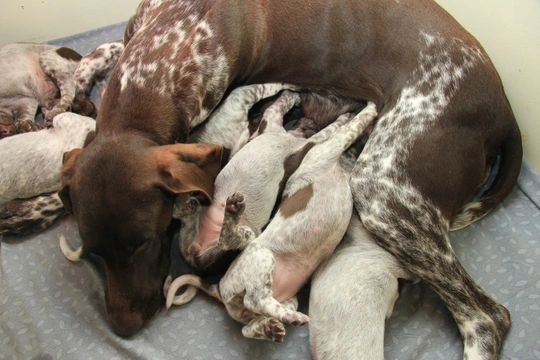
Why might a puppy be stillborn?
A stillborn puppy is one that is already dead at the time that they are born-and if you have been anxiously waiting for your bitch’s litter or are caring for a bitch that is giving birth, it can be very upsetting to see that one or more of the pups is stillborn, even if the rest of the litter is healthy.
If a pup is born dead, they may have died in the womb or during the delivery itself-particularly if the delivery was very long or difficult-and you may be able to tell roughly when the pup passed on based on their development, and how similar they look in size and appearance to the living pups delivered.
If your bitch’s labour was long and problematic, there is a possibility that the pup in question only died very shortly before birth, and there is a chance, albeit a slim one, that you can resuscitate them and get their heart re-started using gentle cardiac massage and if this is successful, delivering breath to their lungs through their nose and mouth. However, this is rarely successful, and most stillborn pups will not be able to be revived.
Stillborn pups are not common in litters bred from healthy dogs and when all goes according to plan with the delivery-but it is still important to realise that they are a possibility, and something that you might have to face if you breed from your dog, or help to deliver a litter.
While you may never know the reason why any given pup is stillborn unless you ask your vet to perform an autopsy examination on the pup and run some tests on the bitch, understanding some of the factors that can lead to stillbirth can help you to do everything possible to avoid stillborn puppies, which is what we will look at in this article.
Read on to learn some of the most common reasons behind why a puppy might be stillborn.
Sexually transmitted infections
Sexually transmitted infections can affect dogs as well as humans, and often display no symptoms in adult dogs-but they can have an acute effect on the viability and health of a litter. Prior to mating any two dogs, having both parties tested for the presence of STI’s such as Brucellosis is important in order to ensure that both parents are in good health, and not carrying a disease that might compromise the litter.
Brucellosis is the most common canine STI, and most dogs that have it will be fine and display no symptoms that something is wrong-but Brucellosis and other canine STI’s are one of the most common causes of stillborn pups and reabsorbed pups in utero, and the leading cause of late-stage miscarriages and stillborn pups in bitches.
Unfortunately, Brucellosis in dogs cannot be cured, and so an infected dog should not be bred from.
Problems during delivery
Dogs have been giving birth on their own for millennia with no need for human assistance or intervention, and most deliveries will go off without a hitch, whether you are there to watch or not! However, problems with delivery can occur-such as a large puppy getting stuck in the birth canal, a pup being the wrong way around for delivery, and various other issues too.
Additionally, thanks to selective breeding to enhance and exaggerate physical traits in some breeds, certain dog breeds are rarely able to deliver their litter naturally, and will require a caesarean section in the majority of cases-the French bulldog being an example, with 75-80% of litters from this breed requiring caesarean section.
If the dam seems to be taking a long time over delivery, is struggling, or something looks or feels wrong-and of course, for breeds that generally need assistance with delivery-leaving it too long to intervene or call the vet can compromise the health of both the litter and the dam, and greatly increase the risk of a puppy, or even the whole litter, being stillborn.
Hereditary health conditions
There are a fairly large range of different hereditary health conditions found in dogs, most of which are specific to certain breeds due to the limited amount of genetic diversity present in the gene pool of any selected breed of pedigree dog.
Pre-breeding health screening for hereditary conditions can help to ensure that only healthy dogs are used for breeding, but even in dogs that produce litters with certain hereditary or congenital health problems, delivery will often go off without a hitch.
However, some hereditary health conditions can lead to spontaneous abortion whilst in utero, and/or late-stage miscarriage and stillborn pups, which again, makes health testing and breeding from only tested healthy dogs important.
An unhealthy or otherwise unsuitable dam
In order to stand a good chance of producing a healthy litter, the dam herself must be healthy, happy, and of an appropriate age to breed. Breeding from a dam that is too young or too old, not physically fit, in poor health or not given the proper nutrients to support pregnancy all increases the chance of stillborn pups, and a range of other problems too.
Stress during pregnancy
A dam that is stressed and anxious during much of her pregnancy is more likely to miscarry early on, but stress, fear or a serious fright can all lead to miscarriage or death of the pups in utero and stillbirth.
Certain types of medications and supplements administered during pregnancy
Finally, certain types of veterinary and over the counter medicines and even “natural” products and supplements can cause problems such as birth defects, miscarriage and still birth, and so it is important that you never give your bitch any medications or supplements if they are pregnant or you are planning to breed from them other than on the advice of your vet, after discussing the full situation with them.



